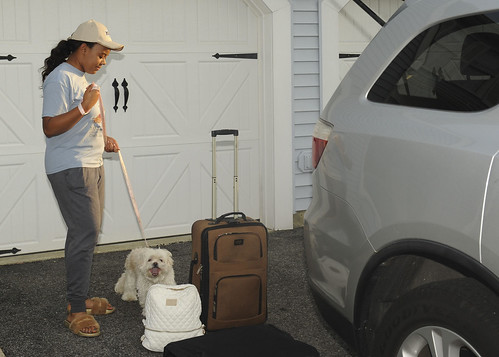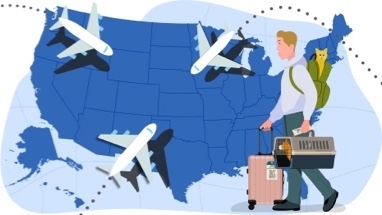Language selection
- Français fr

Travelling with a pet
Starting August 1, 2024 – CDC's new requirements for dogs travelling to the United States
On July 22, 2024, the United States (U.S.) Centers for Disease Control and Prevention (CDC) announced updated import requirements for dogs entering the U.S.
Learn more about the new requirements: Dogs travelling to the U.S.
Changes to the list of countries at high-risk for dog rabies starting August 1, 2024
Effective August 1, 2024, Israel, the West Bank and the Gaza Strip; and Timor-Leste have been added to the list of countries at high-risk for dog rabies and all commercial dogs arriving to Canada from these countries are not permitted entry.
All commercial dogs from countries at high-risk for dog rabies remain prohibited from entering Canada. This list is reviewed regularly and subject to change.
Pets must meet specific requirements when travelling to Canada or another country. It is your responsibility to review all the requirements for your situation.
Some requirements must be completed at specific times and if not completed correctly or on time your pet may not be eligible to travel and be refused entry.
As soon as you know your travel details, contact your local veterinarian to assist with the pet travel process. Requirements could include obtaining a health certificate, updating vaccinations, testing, or administering medications.
Only dogs, cats and ferrets qualify as pets by Canadian Food Inspection Agency (CFIA). Check requirements for other animals if you're travelling with a non-traditional pet.
Travelling to Canada from another country (import requirements)
Requirements for bringing an animal into Canada apply to the following situation:
- animals entering Canada permanently
- animals in transit through Canada on their way to a final destination
- animals entering Canada for a temporary visit
- Canadian animals returning to Canada
Travelling from Canada to another country (export requirements)
The country you're travelling to may have requirements your pet must meet before they can enter the country. Export requirements are determined by each country and can change frequently. Every time you plan to travel with your pet, it is your responsibility to check the requirements and allow enough time to get your pet ready to travel.
- Pets (dogs, cats and ferrets)
- All other animals
Related links
- Dogs travelling to the U.S.
- Look up import requirements (AIRS)
An official website of the United States government
Official websites use .gov A .gov website belongs to an official government organization in the United States.
Secure .gov websites use HTTPS A lock ( Lock A locked padlock ) or https:// means you’ve safely connected to the .gov website. Share sensitive information only on official, secure websites.
Navigating Pet Travel? Let APHIS Help.

When planning an international trip, we often want to bring the whole family – including our pets . But, did you know taking Fido or Fluffy can be a complex, multistep process that requires advance planning and preparation? To help make this process go smoothly, USDA’s Animal and Plant Health Inspection Service (APHIS) has a few simple steps to follow – and a comprehensive website to walk you through the process.
First. Advance preparation is key. Each country has different animal health requirements that travelers must meet so it’s important to start the process early. Our website covers the requirements for more than 130 countries. Check the APHIS Pet Travel Website for your destination country’s entry requirements.
Second. You will need a health certificate. Almost all countries require a USDA-accredited veterinarian to issue (complete, sign, and date) an international health certificate within a certain number of days prior to your departure to confirm the health of your pet. So, as soon as you know where you will be traveling with your pet, contact a local USDA accredited veterinarian to assist you with the process. With 68,000 private, accredited veterinarians nationwide, it’s likely your vet might be one or can refer you to one. Accredited veterinarians work cooperatively with APHIS to protect U.S. animal health and can certify that your pet is healthy and able to travel.
Third. Getting the health certificate endorsed. After the health certificate is issued by a USDA accredited veterinarian, it will typically need to be endorsed (signed and “stamped”) by your local APHIS office . This can be done by mail or, in some cases, in person. APHIS Service Centers are set up to process your health certificate as quickly as possible – but keep in mind, we process many certificates each year so be sure to leave plenty of time for us to complete this process. Endorsement fees for pet health certificates starts at $38, but will cost more if the destination country requires Federal review of test results. Check the APHIS website here for additional information on endorsement fees.
Lastly, don’t forget to check with your airline carrier to see if they have additional requirements to transport your pet. Make sure you know how to collect your pet at the port of entry upon arrival in your destination country. It’s also important to remember that various U.S agencies regulate the entry of your pet back into the United States – plan ahead and check those requirements on the website before you go.
We know navigating various country requirements for international pet travel can be challenging, and that’s why we’re here to help. If you have any questions about the process at any step along the way, please contact the APHIS Customer Service Call Center at 844-820-2234 or your local APHIS Service Center for more information.
Bon Voyage , Fido and Fluffy!
Language selection
- Français fr
Canada, United States agree on protocol to guide the cross-border transit of animals in emergency situations
From: Canadian Food Inspection Agency
Today, the Chief Veterinary Officer (CVO) of Canada, Dr. Mary Jane Ireland and the United States CVO, Dr. Rosemary Sifford, issued the following statement
March 10, 2022 – Ottawa, Ontario Today, the Chief Veterinary Officer (CVO) of Canada, Dr. Mary Jane Ireland and the United States CVO, Dr. Rosemary Sifford, issued the following statement:
"We are pleased to announce that the Canadian Food Inspection Agency (CFIA) and the United States Department of Agriculture's Animal and Plant Health Inspection Service (USDA APHIS), have officially agreed to implement an Emergency Transit Policy for Regulated Animals.
The policy makes it easier and faster to evacuate regulated animals, such as livestock, birds, pets and companion animals, across the border during emergencies such as flooding, forest fires, extreme weather conditions or disasters, or when routine transportation routes are impaired without feasible alternatives. Animals transiting through the other country during an emergency will be instructed when and where they will have to re-enter their country of origin.
Under the joint policy, the country declaring an emergency will inspect animals, apply official seals to transport conveyances, and issue a simplified export health certificate either at the port(s) of exit by an official veterinarian or at the premises of origin by an accredited veterinarian or official veterinarian.
This joint policy is another example of Canada and United States' commitment to protect their animal population and it also shows the continued cooperation in supporting producers in both countries. This policy was developed by the CFIA and USDA under the umbrella of the Canada-US Regulatory Cooperation Council (RCC) which is intended, amongst others, to maintain and enhance the health, safety and security of Canadians and the environment."
Media Relations Canadian Food Inspection Agency [email protected] 613-773-6600
Media Relations United States Department of Agriculture Animal and Plant Health Inspection Service [email protected] 301-851-4100
Page details

An official website of the United States government
Here’s how you know
Official websites use .gov A .gov website belongs to an official government organization in the United States.
Secure .gov websites use HTTPS A lock ( Lock A locked padlock ) or https:// means you’ve safely connected to the .gov website. Share sensitive information only on official, secure websites.

Animal and Plant Health Inspection Service
Pet travel from the United States to Canada
Welcome! This page will guide you through the rules and requirements for traveling internationally with your pet.

Before You Start the Process
Find a usda-accredited veterinarian.
With help from a USDA-accredited veterinarian , you can learn more about your destination country's entry requirements for pets, including any needed vaccinations, tests, or treatments. We recommend creating a schedule to make sure you meet all requirements within the specified timeframe.
Gather This Information for Your USDA-Accredited Veterinarian
- The type of pet traveling
- The destination country
- If applicable, countries where your pet will stop (for customs clearance or upon leaving the airport or seaport) on the way to the destination country
- The date of departure from the United States
- Whether the pet will be traveling alone, as cargo, or with a person in the cabin of the plane
- Note: If you're traveling with a pet bird or exotic animal, you may need to work with additional agencies, such as the U.S. Fish and Wildlife Service (1.41 MB) and Centers for Disease Control and Prevention .
Read These Resources
- In Spanish (En Español): Guía de viaje para mascotas que viajan a otro país desde Estados Unidos
- In Chinese (用中文(表達): 宠物出国旅行指南
- Frequently Asked Questions About Traveling With Your Pet
Travel Requirements Based on Pet Type
Pet dogs OLDER than 8 months do NOT require any health certificate.
- any dog greater than 8 months of age
- assistance animals certified as guide, hearing or service dogs, if the person accompanying the dog to Canada is the user of the dog
- two or less pet dogs accompanied by their owner to Canada
- any dog exported on a temporary basis for competition in a show or trial, if at the time of importation proof of entry in a show or trial is provided.
- Required for all dogs greater than 3 months of age (with the exception of assistance dogs certified as a guide, hearing or service dogs which accompany their user into Canada)
- Issued by licensed vet, proving vaccination within 3 years of importation into Canada.
- Proof of rabies vaccination by documenting on a health certificate, if a health certificate is required.
Learn more about traveling with your dog from the U.S. to Canada
Pet dogs YOUNGER than 8 months old MAY require a health certificate from a licensed veterinarian in the United States. Please see below for more information:
The below information applies to non-commercial shipments of privately owned pets only. If you are shipping pets for commercial purposes, please view the requirements on Canada’s page of APHIS’ International Regulations (IRegs) website .
Unaccompanied dogs (puppies not traveling with their owner):
- Shipments of 1-2 dogs less than 8 months of age which travel unaccompanied are required to be examined and have a health certificate issued by a licensed veterinarian within 72 hours of arrival in Canada.
- The full travel requirements are described in the provided health certificate*. This certificate does not need to be endorsed by APHIS.
Health Certificate (63.24 KB)
Accompanied dogs (puppies traveling with their owner):
- Shipments of 1-2 dogs less than 8 months of age traveling with their owner are only required to travel with proof of current rabies vaccination*.
*Dogs younger than three months old are not required to be vaccinated for rabies but proof of the dog’s age must be available to Canadian Officials. All dogs greater than 3 months of age, with the exception of assistance dogs certified as a guide, hearing or service dogs which accompany their user into Canada, must have proof of current rabies vaccination to travel to Canada.
Pet cats do NOT require any health certificate
- Kittens under 3 months of age exempt from rabies vaccination
- Date of vaccination and the type of vaccine must be on the vaccination certificate
Learn more about traveling with your cat from the U.S. to Canada.
The requirements for traveling with your pet are described in the health certificate. If submission will be via the Veterinary Export Health Certificate System (VEHCS) , you may navigate directly to VEHCS without downloading this PDF.
Health Certificate (173.7 KB)
Pet ferrets do NOT require any health certificate.
Ferrets over 3 months of age should have received a rabies vaccination within the 12 months prior to travel to Canada.
Rabies vaccinated ferrets should travel with a rabies vaccination certificate documenting the pet’s most recent rabies vaccination. The vaccination certificate should clearly identify your pet and must minimally include its sex, age, and breed. The rabies vaccination certificate must be signed by a licensed veterinarian of the United States.
Additional Information Any ferret over 3 months of age traveling without proof of rabies vaccination can be immediately vaccinated upon arrival in Canada at a veterinary clinic without quarantine.
More information about pets can be found on the Canadian Food Inspection Agencyweb site. For pet travel requirements not listed, APHIS has not been officially informed by the foreign country about the requirements for your pet’s travel. We recommended that you contact a government official of the country you are traveling to for more information.
Country of destination contact information:
- World Organisation for Animal Health: Members
- U.S. Department of State: Foreign Embassy & Consulates
Countries Participating in the European Union
Austria Belgium Bulgaria Croatia Cyprus Czech Republic Denmark Estonia
Finland France Germany Greece Hungary Republic of Ireland Italy Latvia
Lithuania Luxembourg Malta Netherlands Northern Ireland * Norway ** Poland Portugal
Romania Slovakia Slovenia Spain Sweden Switzerland **
* Northern Ireland is part of the United Kingdom (UK), but will continue to follow European Union (EU) requirements even though the UK is no longer part of the EU. ** Norway and Switzerland are not part of the EU but have adopted EU legislation for import of most species of live animals.
Important Travel Considerations
If you are transiting (passing through) the european union:.

If your pet is traveling through (transiting) a country in the European Union (EU) on the way to a third, non-EU country, you will also need a transit health certificate for your pet for the EU. The transit health certificate will be the same as if your pet’s final destination was the EU country. Use the information and steps above under “Travel Requirements Based on Pet Type” to determine which health certificate should be used. View a list of EU countries .
Considerations for airline travel:
Airlines and shipping lines have their own policies and requirements for transporting pets. Check with your airline or shipping representative to determine what requirements they may have.
View additional information for pet owners, airlines, and others about APHIS endorsement of international health certificates (239.52 KB) .
Will you be returning to the United States with your pet?

View the Requirements ALERT: Read the CDC Notice of Temporary Suspension of Dogs Entering the United States From Countries Classified as High Risk for Dog Rabies .
Information for Accredited Veterinarians
Green banner country.
For Accredited Veterinarians: Electronic signature ACCEPTED
For APHIS VMO: Digital endorsement ACCEPTED

Save Time and Money With VEHCS!
Accredited veterinarians can submit health certificates for USDA endorsement electronically through VEHCS (Veterinary Export Health Certification System). This country accepts USDA digital endorsement . This means the final, endorsed health certificate that travels with the animal(s) can be printed out directly from VEHCS and does NOT have to be mailed back to you.
VEHCS Help | VEHCS Guide (7.58 MB) | VEHCS Login

IMAGES
VIDEO
COMMENTS
Issued by licensed vet, proving vaccination within 3 years of importation into Canada. Proof of rabies vaccination by documenting on a health certificate, if a health certificate is required. Learn more about traveling with your dog from the U.S. to Canada.
If you want to travel with your pet to another State or country, you'll need to meet these requirements whether you're traveling by plane, car, train, or boat.
If you are travelling with a pet or planning to import an animal to Canada, you will need the right paperwork at the border to meet Canada's import requirements. If you don't, you risk …
Pet Travel From the United States to Canada. Last Modified: Travel Requirements Based on Pet Type. Carefully read ALL of the requirements related to your pet on this page. This page …
Find out what you need before you travel with your pet or import an animal. New CDC requirements for dogs travelling to the U.S. Starting August 1, 2024, dogs travelling from Canada to the United States will need to meet new import …
Requirements could include obtaining a health certificate, updating vaccinations, testing, or administering medications. Only dogs, cats and ferrets qualify as pets by Canadian Food …
Each country has different animal health requirements that travelers must meet so it’s important to start the process early. Our website covers the requirements for more than 130 countries. Check the APHIS Pet …
The policy makes it easier and faster to evacuate regulated animals, such as livestock, birds, pets and companion animals, across the border during emergencies such as …
With help from a USDA-accredited veterinarian, you can learn more about your destination country's entry requirements for pets, including any needed vaccinations, tests, or …
A) For U.S. Dogs coming to Canada. A dog entering Canada needs to have a rabies vaccination certificate (dogs must have been at least three months of age at the time …